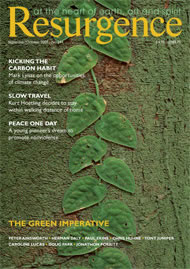Clown: What is the opinion of Pythagoras concerning wild fowl?
Malvolio: That the soul of our grandam might happily inhabit a bird.
– William Shakespeare, Twelfth Night, IV.ii
THIS SELDOM REMEMBERED quotation forms the epigraph to one of Tristram Stuart’s chapters, and expresses the complexity and scope of his work. For The Bloodless Revolution is far more than merely a study of the Western vegetarian movement’s history. It is about the encounter between two civilisations, driven by colonialism and commerce, but often intricate and tender, sometimes painful, frequently exhilarating. Within Indian culture, many thoughtful Westerners, including soldiers, administrators and merchants, found spiritual riches lacking in their increasingly mechanistic and ‘progress’-driven society. Within Western culture, many thoughtful Indians, including anti-colonialists, were inspired by scientific rationalism and the principle of individual freedom under the rule of law.
In their encounter with Indian culture, Europeans of the early modern and industrial eras did not merely discover something different and ‘new’, but revisited an aspect of their own civilisation that had been buried and suppressed. This is perhaps the most important theme of Stuart’s book, vegetarianism itself being one of many practical responses to this encounter. Among Hindus and Jains, the main philosophical justification for the vegetarian diet is the doctrine of ahimsa, or non-injury: to avoid unnecessary harm to other forms of life. For, as the Jain seer Mahavira proclaimed, “Nonviolence and kindness to all living beings is kindness to oneself.” The spiritual intuition that all life is interconnected forms the basis of Indian philosophy, but it is also part of the West’s cultural inheritance, as the example of Pythagoras illustrates. Reincarnation, or more properly the transmigration of souls, is an expression of interconnectedness and a justification for practices associated with ahimsa, including vegetarianism.
The idea that the soul, which is the essence of life in Indian culture, could reincarnate from human to animal and back, gives us good reason to treat animals with respect. To Westerners, this ‘Indian’ idea was (and for some still is) alien, for it challenges the separation of humanity and nature promoted by mainstream Judaeo-Christianity and mechanistic secular rationalism. Indeed, in the West ideas of continual ‘progress’ and ‘growth’ and innate human superiority – anthropocentrism, or human-centredness – are far older than the Judaeo-Christian tradition. Yet from classical antiquity onwards there has been another well-trodden path. As we have seen, Pythagoras believed in transmigration: he is even said to have recognised in the face of a dog a long-lost human friend. The theme of interconnectedness inspired St Francis of Assisi and his followers, the Jewish Kabbalists and the Sufi mystics of Islam, the Cathars and Anabaptists, the Romantics, High Tories, anarchists and early socialists and the various strands of ecological thinking today. And, from ancient Athens to modern San Francisco, vegetarianism has been a part of this alternative Western worldview.
The Bloodless Revolution helps us to understand that the relationship between ‘the West’ and ‘India’ is less one of polarisation and opposition, and more one of overlap and continuity. Thus, in 19th-century New England, Thoreau read the Bhagavadgita and Upanishads and learned that rights extended well beyond the narrow human realm. Gandhi, in turn, was empowered by Thoreau’s belief in civil disobedience to defeat oppressive rulers or iniquitous laws. He therefore transformed the doctrine of ahimsa into a philosophy and practice of ‘nonviolent nonco-operation’ which was instrumental in ending British rule, and which in turn was to inspire Martin Luther King.
Stuart’s book is a veritable feast of information, anecdotes and meetings with remarkable men and women. It reminds us, as humans, that we are truly a part of nature, but that our reasoning powers give us responsibilities towards other creatures – and, of course, towards the planet. When we modify our diet and reduce our ecological impact, we are not ‘returning to nature’ but going forward to it. We are uniting spiritual intuition with scientific reason, and rational self-interest with concern for all forms of life. The Bloodless Revolution reminds us that we have the strength to move away from relationships of dominance – from anthropocentrism to colonialism. It is a remarkable achievement.







